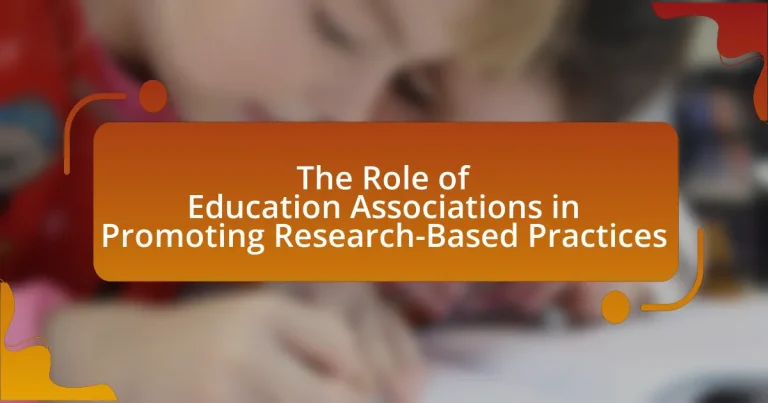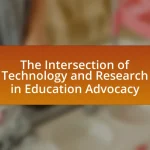Education associations play a vital role in promoting research-based practices within the educational sector by providing resources, professional development, and advocacy for evidence-based methodologies. They influence educational research through funding, establishing research priorities, and facilitating collaboration between educators and researchers. The article outlines how these associations prioritize research focused on effective teaching methods and educational policy analysis, disseminate findings through publications and conferences, and enhance teaching effectiveness by equipping educators with evidence-backed strategies. Additionally, it addresses the challenges faced by education associations, including funding limitations and resistance from educators, while highlighting best practices for engaging members in research initiatives and evaluating the impact of research-based practices on student outcomes.
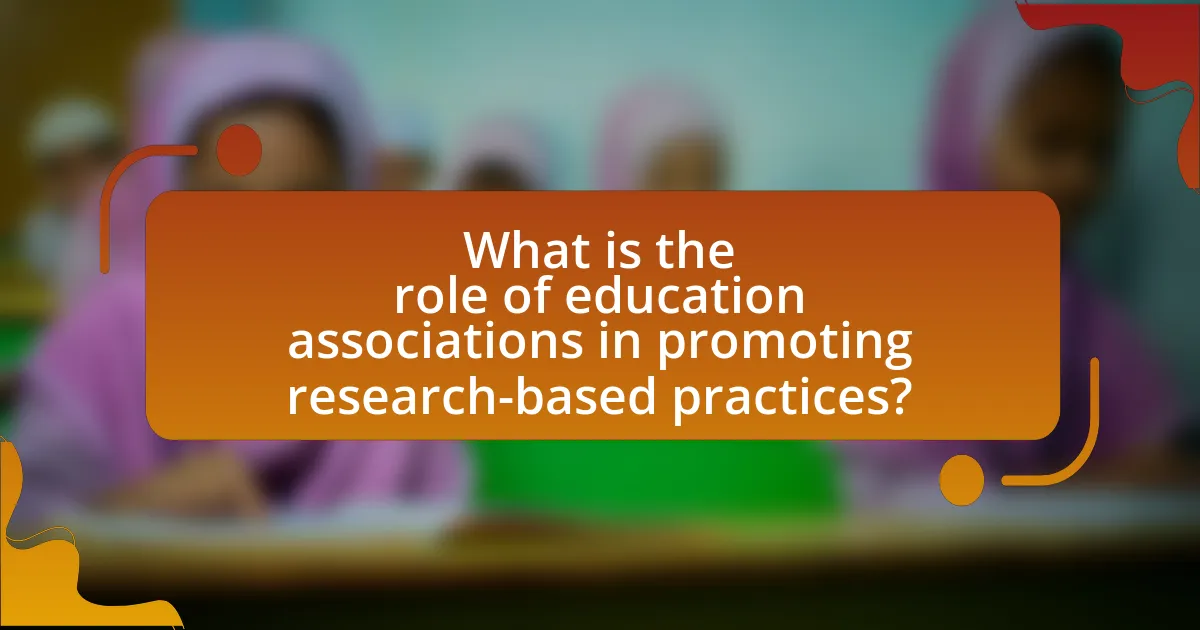
What is the role of education associations in promoting research-based practices?
Education associations play a crucial role in promoting research-based practices by providing resources, professional development, and advocacy for evidence-based methodologies. These organizations facilitate the dissemination of research findings through conferences, publications, and networking opportunities, enabling educators to implement effective strategies in their classrooms. For instance, the American Educational Research Association publishes numerous journals that highlight empirical studies, which educators can use to inform their teaching practices. Additionally, education associations often collaborate with researchers to develop guidelines and best practices that are grounded in scientific evidence, ensuring that educators have access to the most current and relevant information.
How do education associations influence educational research?
Education associations influence educational research by providing funding, establishing research priorities, and facilitating collaboration among educators and researchers. These associations often allocate grants for specific studies, which directs the focus of research towards areas deemed important for educational advancement. For instance, the American Educational Research Association (AERA) offers various funding opportunities that encourage research on pressing educational issues. Additionally, education associations set agendas that highlight critical topics, thereby shaping the research landscape. They also create platforms for networking and sharing findings, such as conferences and publications, which disseminate research results and promote evidence-based practices among educators. This interconnectedness between funding, prioritization, and collaboration underscores the significant role education associations play in steering educational research.
What types of research do education associations prioritize?
Education associations prioritize research that focuses on evidence-based practices, educational policy analysis, and the effectiveness of teaching methods. This prioritization is driven by the need to improve educational outcomes and inform policy decisions. For instance, studies such as the “What Works Clearinghouse” by the Institute of Education Sciences provide rigorous evaluations of educational interventions, demonstrating the importance of data-driven approaches in education. Additionally, research on equity and access in education is emphasized to address disparities among different student populations, ensuring that all students receive quality education.
How do education associations disseminate research findings?
Education associations disseminate research findings primarily through publications, conferences, and online platforms. These organizations publish research in academic journals, newsletters, and reports, ensuring that findings reach educators and policymakers. For instance, the American Educational Research Association (AERA) publishes the “Educational Researcher” journal, which features peer-reviewed articles that contribute to the field. Additionally, education associations host annual conferences where researchers present their findings, facilitating direct engagement and discussion among educators. Online platforms, including websites and social media, further extend the reach of research findings, allowing for broader access and interaction. This multi-faceted approach ensures that research is effectively communicated and utilized in educational practices.
Why are research-based practices important in education?
Research-based practices are important in education because they enhance teaching effectiveness and improve student outcomes. These practices are grounded in empirical evidence, which demonstrates their efficacy in various educational settings. For instance, a study published in the “Journal of Educational Psychology” by Hattie (2009) found that instructional strategies based on research can lead to significant gains in student achievement, with effect sizes indicating that certain methods can double the rate of learning. By implementing research-based practices, educators can make informed decisions that foster a more effective learning environment, ultimately benefiting students’ academic success.
What impact do research-based practices have on student outcomes?
Research-based practices significantly enhance student outcomes by improving academic performance and engagement. Studies indicate that implementing evidence-based strategies, such as differentiated instruction and formative assessment, leads to higher test scores and increased student motivation. For instance, a meta-analysis by Hattie (2018) found that effective teaching strategies can increase student achievement by an average of 0.4 standard deviations, which is considered a substantial effect. Additionally, research from the Institute of Education Sciences shows that schools adopting research-based interventions see a marked improvement in student learning and retention rates.
How do research-based practices enhance teaching effectiveness?
Research-based practices enhance teaching effectiveness by providing educators with evidence-backed strategies that improve student learning outcomes. These practices are grounded in empirical studies that demonstrate their efficacy, such as differentiated instruction, formative assessment, and collaborative learning. For instance, a meta-analysis by Hattie (2009) found that strategies like feedback and teacher-student relationships significantly boost student achievement, highlighting the importance of using research to inform teaching methods. By implementing these practices, educators can tailor their approaches to meet diverse student needs, ultimately leading to more effective teaching and improved academic performance.
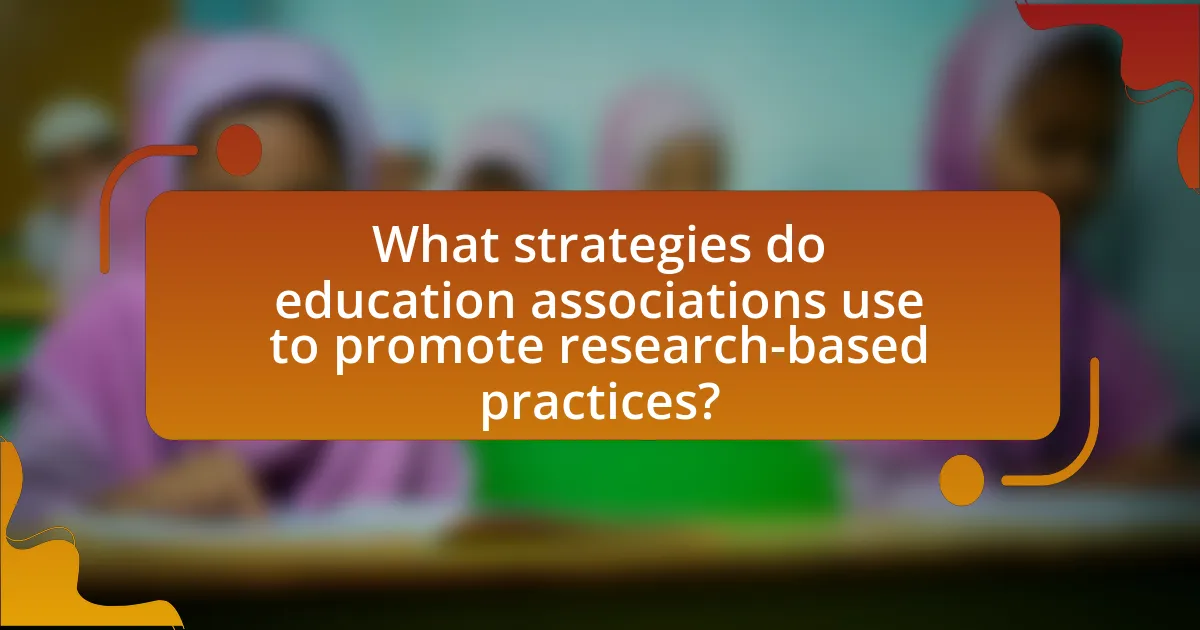
What strategies do education associations use to promote research-based practices?
Education associations promote research-based practices through strategies such as professional development programs, dissemination of research findings, and advocacy for evidence-based policies. These associations often organize workshops and conferences that provide educators with the latest research insights and practical applications, enhancing their teaching effectiveness. For instance, the American Educational Research Association regularly publishes research journals and hosts events that connect educators with cutting-edge studies. Additionally, these associations engage in advocacy efforts to influence educational policy, ensuring that research findings are integrated into legislative frameworks, thereby promoting a culture of evidence-based decision-making in education.
How do education associations provide professional development?
Education associations provide professional development through a variety of structured programs, workshops, and resources designed to enhance educators’ skills and knowledge. These associations often organize conferences that feature expert-led sessions on current educational practices, allowing educators to learn from leaders in the field. Additionally, they offer online courses and webinars that provide flexible learning opportunities, enabling educators to engage with research-based content at their convenience.
For instance, the National Education Association (NEA) provides a range of professional development resources, including access to research articles and best practice guides, which support educators in implementing effective teaching strategies. Furthermore, many associations collaborate with universities and research institutions to develop evidence-based training programs, ensuring that the professional development offered is grounded in the latest educational research.
What types of training programs do education associations offer?
Education associations offer various training programs, including professional development workshops, online courses, certification programs, and conferences. These programs are designed to enhance educators’ skills, promote best practices, and ensure that teaching methods are aligned with current research. For instance, the National Education Association provides resources and training focused on instructional strategies and classroom management, which are essential for effective teaching. Additionally, many associations collaborate with universities to offer specialized training that incorporates the latest educational research, ensuring that educators are well-equipped to implement evidence-based practices in their classrooms.
How do these programs incorporate research findings?
These programs incorporate research findings by integrating evidence-based strategies into their curricula and training modules. Education associations analyze current research to identify effective teaching practices, which are then disseminated to educators through workshops, publications, and online resources. For instance, the National Education Association (NEA) emphasizes the use of research from studies such as “The Impact of Teacher Professional Development on Student Achievement” by Yoon et al. (2007), which demonstrates that targeted professional development significantly enhances teaching effectiveness and student outcomes. This systematic approach ensures that educational practices are grounded in validated research, thereby improving overall educational quality.
What role do partnerships play in promoting research-based practices?
Partnerships play a crucial role in promoting research-based practices by facilitating collaboration between educational institutions, researchers, and practitioners. These collaborations enhance the dissemination of evidence-based strategies, ensuring that research findings are effectively translated into classroom practices. For instance, partnerships between universities and schools often lead to joint professional development programs that equip educators with the latest research insights, thereby improving teaching effectiveness. Additionally, studies have shown that such partnerships can increase the adoption of innovative practices, as they provide a support network for educators to share experiences and resources, ultimately leading to improved student outcomes.
How do education associations collaborate with universities and researchers?
Education associations collaborate with universities and researchers by facilitating partnerships that enhance educational research and practice. These associations often provide funding opportunities, resources, and platforms for sharing research findings, which helps bridge the gap between theory and practice in education. For instance, the American Educational Research Association (AERA) hosts annual conferences that bring together educators and researchers to discuss the latest findings and methodologies, fostering a collaborative environment. Additionally, education associations may publish journals that feature peer-reviewed research, ensuring that innovative practices are disseminated widely among educators. This collaboration ultimately supports the development of evidence-based practices in educational settings.
What benefits arise from these partnerships for educators?
Partnerships with education associations provide educators with access to valuable resources, professional development opportunities, and a network of support. These collaborations enhance educators’ knowledge of research-based practices, allowing them to implement effective teaching strategies. For instance, studies show that educators who engage with professional organizations report improved instructional practices and increased student outcomes. Additionally, partnerships often facilitate access to the latest educational research, enabling educators to stay informed about innovative methodologies and trends in education.
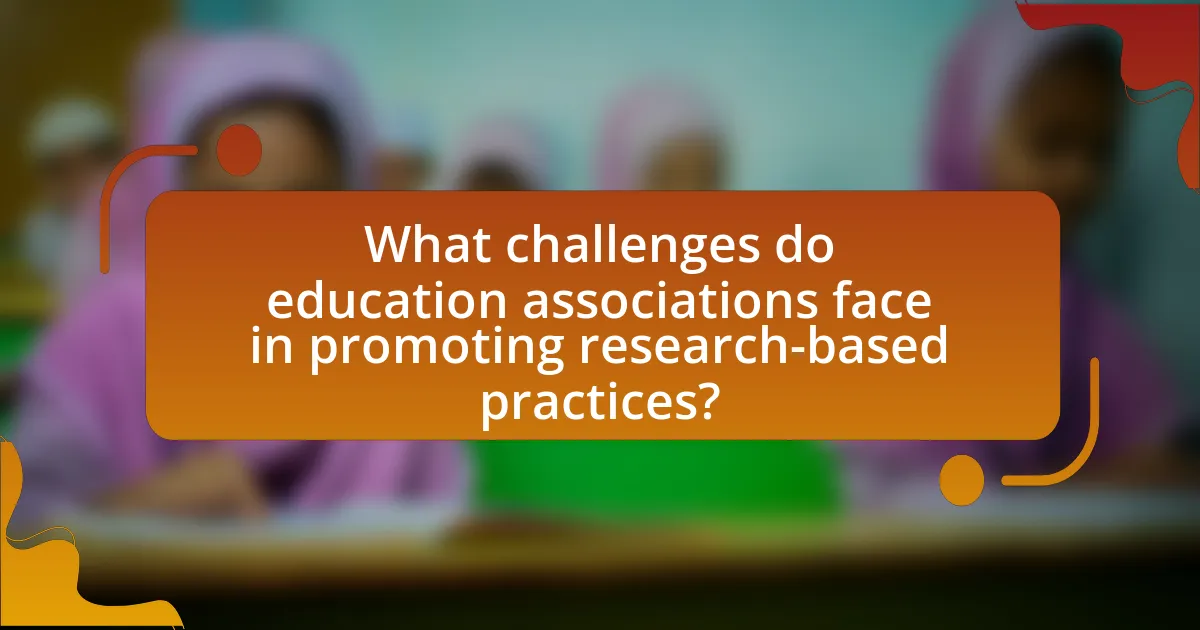
What challenges do education associations face in promoting research-based practices?
Education associations face significant challenges in promoting research-based practices, primarily due to resistance from educators and institutional inertia. Many educators are accustomed to traditional teaching methods and may be skeptical of new research findings, leading to reluctance in adopting innovative practices. Additionally, education associations often encounter limited resources and funding, which restrict their ability to disseminate research effectively and provide necessary training. A study by the National Education Association highlights that only 30% of teachers feel adequately prepared to implement research-based strategies, indicating a gap in support and professional development. This resistance and lack of resources hinder the successful promotion of evidence-based practices in educational settings.
How do funding limitations affect the initiatives of education associations?
Funding limitations significantly hinder the initiatives of education associations by restricting their ability to implement programs and support research-based practices. When financial resources are scarce, education associations struggle to provide professional development, conduct research, and advocate for policy changes effectively. For instance, a study by the National Education Association found that budget constraints led to a 30% reduction in training programs for educators, directly impacting the quality of education and the adoption of innovative teaching methods. Consequently, limited funding results in fewer resources for collaboration and dissemination of best practices, ultimately undermining the associations’ mission to enhance educational outcomes.
What strategies can education associations employ to overcome funding challenges?
Education associations can employ diversified funding strategies to overcome funding challenges. These strategies include establishing partnerships with private organizations, applying for grants from government and philanthropic sources, and creating membership-driven revenue models. For instance, the National Education Association has successfully utilized grants to fund various educational initiatives, demonstrating the effectiveness of this approach. Additionally, by offering professional development programs and resources, associations can generate income while providing value to their members, thus ensuring financial sustainability.
How can education associations advocate for increased funding?
Education associations can advocate for increased funding by mobilizing their members to engage in grassroots lobbying efforts. These associations can organize campaigns that highlight the importance of educational funding, utilizing data and research to demonstrate the positive impact of adequate funding on student outcomes. For instance, studies have shown that increased funding correlates with improved student performance and graduation rates, making a compelling case for financial support. By presenting this evidence to policymakers and the public, education associations can effectively influence funding decisions.
What resistance do education associations encounter from educators?
Education associations encounter resistance from educators primarily due to skepticism about the relevance and applicability of research-based practices. Many educators feel that the recommendations made by these associations do not align with their classroom realities or the specific needs of their students. This disconnect often leads to reluctance in adopting new methodologies promoted by the associations. Additionally, educators may resist changes due to a lack of adequate training or support in implementing these practices, which can create feelings of inadequacy or overwhelm. Research indicates that when educators perceive a gap between research and practice, their willingness to engage with education associations diminishes, ultimately hindering the adoption of innovative teaching strategies.
How can education associations address skepticism towards research-based practices?
Education associations can address skepticism towards research-based practices by actively engaging educators in the research process and providing clear, accessible evidence of the effectiveness of these practices. By facilitating professional development workshops that showcase successful case studies and empirical data, associations can demonstrate the tangible benefits of implementing research-based strategies. For instance, a study published in the “Journal of Educational Psychology” by Hattie (2009) highlights that evidence-based practices can significantly improve student outcomes, which can help alleviate doubts among educators. Additionally, associations can create platforms for educators to share their experiences and outcomes with research-based practices, fostering a community of trust and collaboration.
What role does communication play in overcoming resistance?
Communication is essential in overcoming resistance as it facilitates understanding, addresses concerns, and fosters collaboration among stakeholders. Effective communication helps clarify the rationale behind changes, allowing individuals to grasp the benefits and implications of new practices. For instance, research indicates that transparent communication can reduce anxiety and uncertainty, which are common barriers to acceptance. A study by Kotter (1996) emphasizes that organizations that prioritize clear communication during change initiatives experience higher levels of employee engagement and lower resistance rates. Thus, communication serves as a critical tool in bridging gaps, aligning perspectives, and ultimately easing the transition to new practices.
What are the best practices for education associations in promoting research-based practices?
Education associations should prioritize collaboration with researchers and practitioners to effectively promote research-based practices. This collaboration can be achieved through organizing workshops, conferences, and webinars that facilitate the exchange of knowledge and experiences. For instance, the American Educational Research Association regularly hosts events that connect educators with the latest research findings, enhancing the implementation of evidence-based strategies in classrooms. Additionally, education associations should develop and disseminate clear guidelines and resources that summarize research findings in accessible formats, ensuring that educators can easily integrate these practices into their teaching. Research from the Institute of Education Sciences indicates that when educators have access to concise, actionable information, they are more likely to adopt effective practices. By fostering a culture of continuous professional development and providing ongoing support, education associations can significantly influence the adoption of research-based practices in educational settings.
How can education associations effectively engage their members in research initiatives?
Education associations can effectively engage their members in research initiatives by creating collaborative platforms that facilitate participation and knowledge sharing. These platforms can include online forums, webinars, and workshops that encourage members to contribute their insights and experiences related to research. For instance, the American Educational Research Association (AERA) hosts annual meetings and provides resources that allow educators to present their research findings, fostering a community of practice. Additionally, providing incentives such as grants or recognition for members who participate in research projects can further motivate engagement. Research indicates that active involvement in research initiatives leads to improved educational practices and outcomes, as seen in studies conducted by the National Center for Education Statistics, which highlight the positive correlation between educator participation in research and student achievement.
What methods can be used to evaluate the impact of research-based practices?
To evaluate the impact of research-based practices, methods such as randomized controlled trials (RCTs), quasi-experimental designs, and longitudinal studies can be employed. RCTs provide a high level of evidence by randomly assigning participants to treatment and control groups, allowing for clear comparisons of outcomes. Quasi-experimental designs, while lacking randomization, can still offer valuable insights by using matched groups or pre-and post-intervention assessments. Longitudinal studies track changes over time, providing data on the sustained effects of practices. These methods are supported by educational research, such as the Institute of Education Sciences’ findings, which emphasize the importance of rigorous evaluation in determining the effectiveness of educational interventions.
